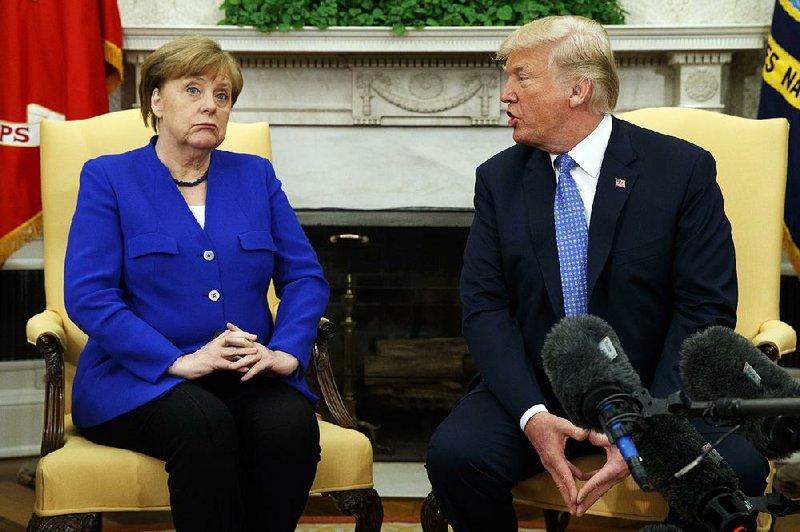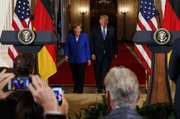WASHINGTON -- President Donald Trump welcomed German Chancellor Angela Merkel to the White House on Friday for a visit of less than three hours.
He greeted Merkel outside the West Wing with a handshake and a kiss on each cheek, a traditional welcome but far short of the bountiful display of personal warmth earlier in the week when he hosted French President Emmanuel Macron for a lavish three-day state visit.
Trump, in brief remarks alongside Merkel in the Oval Office, called her an "extraordinary woman," congratulated her on her recent re-election and disputed any idea that their rapport was frosty.
"We have a really great relationship," Trump told reporters before he and Merkel were to meet privately. "We actually have had a great relationship, right from the beginning."
Though her visit was short on pomp, Merkel's message was similar to Macron's -- that America and Europe need to bury the hatchet on key issues, from global trade to international security.
In a joint news conference Friday afternoon, it was apparent that despite the back-to-back visits, Trump's divisions with Europe are still substantial.
Like Macron, Merkel was expected to implore Trump not to abandon the nuclear deal with Iran, a pursuit the French president predicted before his departure was unlikely to be successful.
Merkel used her meeting with Trump to try to paper over the differences, calling the agreement enacted under former President Barack Obama a "first step" toward curtailing and containing Iran's regional ambitions and suggesting openness to a side agreement.
Trump has said he was open to new negotiations with Iran, but has not said whether he would heed European calls for the U.S. to stay in the deal, which aims to restrict Iran's nuclear efforts, while those talks are underway. His decision is expected by May 12.
Merkel is also seeking a permanent exemption for Germany from steel and aluminum tariffs that Trump imposed in March, another goal that analysts said appeared out of reach.
Merkel said there was little progress on seeking permanent exemptions for the EU from the tariffs. "The decision lies with the president," she said.
Trump implicitly scolded Germany for not meeting its defense spending obligations to NATO, saying it is "essential that our NATO allies increase their financial contribution" to the pact.
Merkel said Germany's latest budget will take defense spending to 1.3 percent of GDP. She acknowledged that's far short of the 2 percent goal but said Germany is still aiming for that over time.
In the hours before Merkel's arrival at the White House, Trump took note of their limited schedule, which was to include a 30-minute Oval Office meeting, followed by a working lunch and joint news conference.
"Look forward to meeting with Chancellor Angela Merkel of Germany today," Trump tweeted. "So much to discuss, so little time! It will be good for both of our great countries!"
While Macron and Trump went to great lengths to display their affection through hearty handshakes, hugs -- and, at times, air kisses -- the president has not displayed quite the same chemistry with Merkel.
In their first White House meeting last spring, Trump seemed to ignore photographers' prompts to give Merkel the traditional photo-op handshake. And the German chancellor looked on unhappily when Trump upbraided NATO nations last summer for not spending enough on defense as he stood in NATO's gleaming new Brussels headquarters.
On Friday, Trump greeted Merkel courteously, kissing both of her cheeks when she stepped out of her limousine at the entrance to the West Wing.
Kellyanne Conway, a senior counselor to Trump, said the president's relationships with Merkel and Macron don't need to be compared.
[PRESIDENT TRUMP: Timeline, appointments, executive orders + guide to actions in first year]
"France and Germany are great allies. I think every leader is different, every relationship is different," Conway said at the White House. "We're very happy that Chancellor Merkel is making another trip here."
Merkel thanked Trump for the "warm reception" and said she was looking forward to productive talks.
"We wish to deepen our relationship further," she said in German.
While Macron has been positioning himself as Europe's "Trump whisperer" and conduit to an American president who seems intent on upending U.S. relationships with allies, Merkel maintains her strength as the head of the largest economy in Europe. And if this visit produces a similar lack of geniality, that might just be fine with Merkel, who has little to gain at home by being overly friendly with Trump, according to German political analyst Jan Techau.
"For Merkel, it's quite important domestically not to be seen to be getting too close to Trump," said Techau, a senior fellow at think tank The German Marshall Fund of the United States. Anti-American sentiment has been growing again in Germany since Trump's election, with mainstream media regularly portraying the U.S. president as a threat to the world.
The Macron state visit had been long planned, while Merkel's more informal working visit was added to the schedule so her trip to Washington would be the first outside Europe since her election victory. Two deadlines loom large.
The first is Trump's demand for an overhaul by May 12 of the international nuclear deal with Iran -- an agreement that Germany, like France, worked hard to secure and believes should remain in place.
Although Germany is unlikely to accept a wholesale rewrite of the deal, Berlin has indicated that it is prepared to consider add-ons that would crack down on Tehran's ballistic missile program and curb Iranian efforts to strengthen its strategic role in the Middle East. Earlier this week, Macron made clear that France would not follow the U.S. lead if Trump decides to withdraw from the agreement.
Macron later told French reporters that he has no "inside information" on Trump's decision on the Iran deal but noted that it's clear the U.S. president "is not very much eager to defend it."
The second deadline concerns the extension of new U.S. tariffs on foreign-made steel and aluminum, which some fear could trigger a global wave of protectionism that would deeply harm a trading nation such as Germany.
Though German officials have signaled that their goals for the visit are modest, Berlin last week announced plans to step up defense spending, a long-standing demand in Washington. While Germany is still likely to miss the goal of devoting 2 percent of its gross domestic product to defense that's expected of NATO members, the move could be taken as a sign that Berlin has gotten the message.
Some German officials have been quietly playing with the idea of buying U.S.-made F-35 jets to replace the country's aging fleet of Tornado planes. The hope is that this would show Berlin's willingness to act on military spending while also improving the U.S. trade balance with Germany.
Information for this article was contributed by Jonathan Lemire and Frank Jordans of The Associated Press; and by Julie Hirschfeld Davis of The New York Times.
A Section on 04/28/2018


